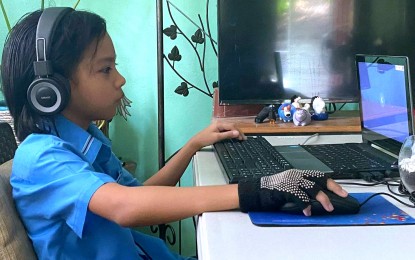
(PNA file photo)
MANILA – Several studies have revealed that the country has become one of the world’s largest sources of online child sexual exploitation and abuse cases with a rapid increase in cyber tip reports, aggravated by the coronavirus disease (Covid-19) pandemic.
With Republic Act 11930 or the Anti-Online Sexual Abuse and Exploitation of Children (OSAEC) Law, which lapsed into law last July 30, several child rights groups such as the Child Rights Network (CRN) said this marks the dawn of safer online spaces for children.
The CRN said the two new laws signaled a victory for all child advocates and champions pushing for a landmark legislation that would protect Filipino children and erase the country's image as one of the most dangerous places for children to access the internet.
"It is our fervent wish for Filipino children to safely navigate the virtual space without fear. RA 11930 symbolizes the break of dawn heralding a future where no more children are harmed, abused, and victimized through the Internet," CRN convenor Romeo Dongeto said in a statement on Thursday.
Data from the US-based National Center for Missing and Exploited Children showed the rapid increase of OSAEC cases in the country during the pandemic, noting a 209-percent increase in cyber tip reports for the Philippines, with 1,294,750 cyber tips in 2020 as compared to 418,422 cyber tips in 2019.
A risk assessment report released by the Philippine Anti-Money Laundering Council in 2020 showed that there had been a significant rise in the suspicious financial transactions reported related to the OSAEC in 2020.
From the 597 suspicious transaction reports recorded in May 2019, the figures swelled to 5,634 in May 2020.
“With children staying more in their homes, online platforms became a basic need for them to continue their education and maintain a sense of normalcy. Coupled with economic difficulties, this situation made it easier for OSAEC perpetrators to prey on children,” the CRN said.
The new law, Dongeto said, holistically responds to the advocates' longstanding call for stronger online child safety regulations and makes cyberspace safe for children.
With RA 11930 in place, law enforcement authorities can now swiftly pursue violators of the OSAEC Law and effectively tear the veil of anonymity that hides their nefarious acts in cyberspace.
The new law enables the government to work in tandem with the private sector by not only blocking child sexual abuse or exploitation materials but also ensuring that technological or other practical safeguards are in place to prevent or detect recruitment and trafficking.
"Essentially, RA 11930 plugs fundamental loopholes in existing laws and regulations concerning OSAEC by providing clear definitions that succinctly consider the often-ephemeral quality of OSAEC committed through the viewing or live-streaming of online content that does not need the offender to do any act of downloading or retaining any form of child sexual abuse materials," Dongeto said.
Meanwhile, private individuals, especially parents, hailed the passage of the law, which they say is very timely, especially in this digital age.
Lea Alim Agustin, an elementary school teacher handling Grade 1 students mostly between the age of 7 and 8 years old, who are very vulnerable to online sexual predators, said the law will give them peace of mind.
“As a mother and educator as well, I acknowledge that modern technology is a great tool for learning and seeking knowledge, but with its broad spectrum, there are so many things in the online world that children will not easily understand, therefore, there should be rules in using it. I believe that OSAEC law can help protect our kids, especially against online sexual abuse,” she said.
Jovenal Villano, a former educator and a father to a two-year-old child, believes in the importance and timely passage of the OSAEC Law.
“I think OSAEC is very essential in our society, especially in the current trend and world of technology today. Since students, children or minors are exposed to the internet almost everyday for their online classes, research, and social media, they are really an easy target of those abusers. That's why I think this law is very important to be implemented and imposed in order to minimize or control if not totally eliminate the acts of these abusers,” Villano said. (PNA)
